NHS Waiting Times Versus Private: What Patients Need to Know
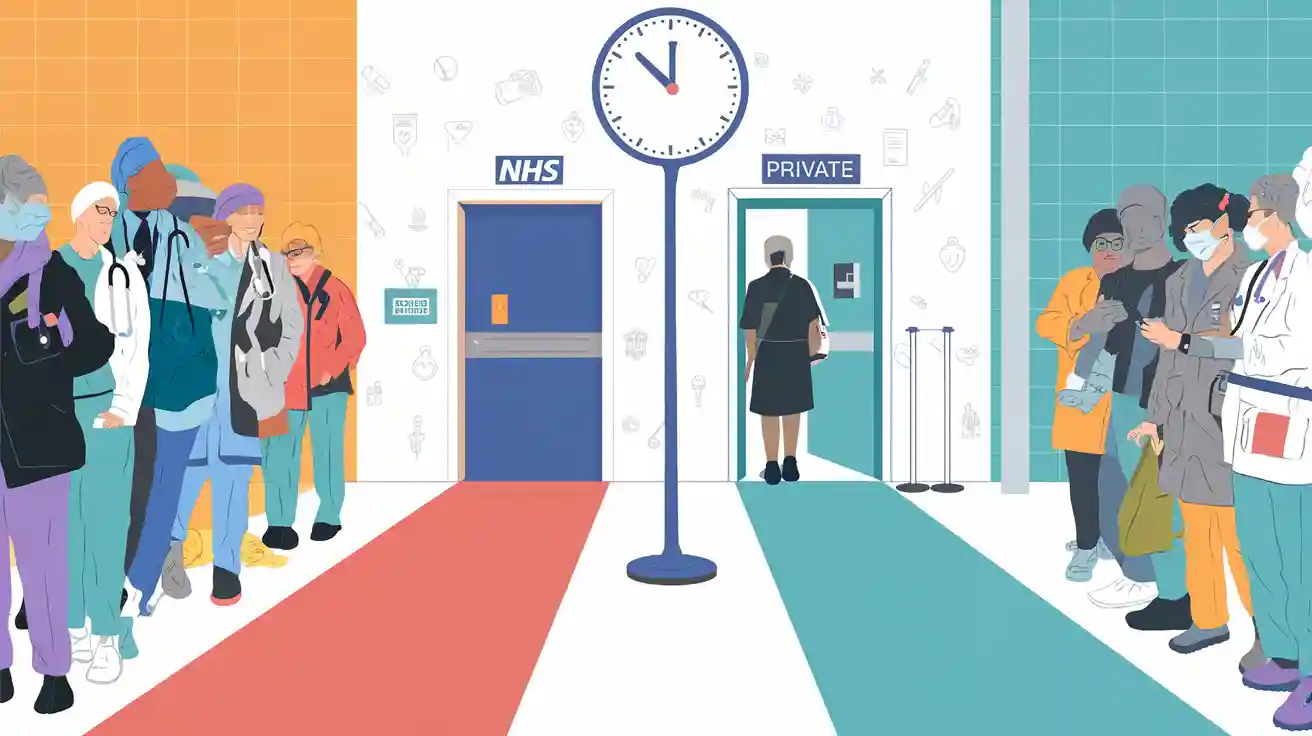
You might ask how long you must wait for treatment with the NHS compared to private healthcare. NHS waiting times now affect over 7.5 million people. Many people wait more than 18 weeks. The table below shows how delays are different across England.
Category | NHS Waiting Times (England) | Notes |
|---|---|---|
Total Waiting List | Around 7.5 million unique patient pathways | Shows pressure on the whole system |
Patients Waiting Over 18 Weeks | More than 2.5 million | NHS wants 92% seen in 18 weeks, but misses this |
Patients Waiting Over 52 Weeks | Over 350,000 | Many patients face very long delays |
Patients Waiting Over 78 Weeks | Over 100,000 | A lot of people have extreme delays |
Median Waiting Time (All Specialties) | Usually 14-16 weeks | This is longer than NHS targets and changes by region |
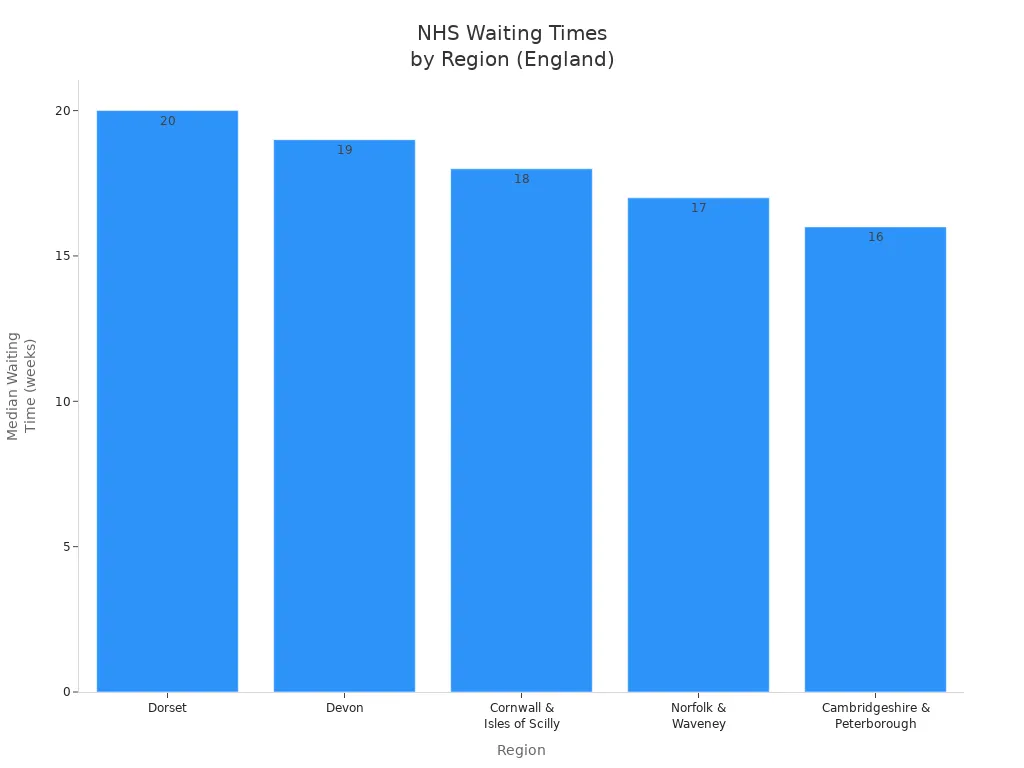
Private healthcare can give you faster access, sometimes in days or weeks. Long NHS waits often make you look for private options. This is true if you want quicker care or more choice. Recent studies show delays make healthcare cost more and can harm your health. Waiting times are important when you choose between NHS or private treatment.
Key Takeaways
NHS waiting times are often very long. Millions wait over 18 weeks. Some people wait more than a year. This causes delays in diagnosis and treatment.
Private healthcare gives much faster access. Waits for consultants, tests, and surgery are shorter. This helps patients get care sooner.
Long NHS waits can harm health and wellbeing. Private care can reduce pain. It can help people recover faster by giving quicker treatment.
Private healthcare costs more money. It gives more choice, comfort, and control over when you get treatment. NHS care is free but has less choice.
Check official NHS waiting times. Talk to your GP about your options. This can help you decide if NHS or private care is best for you.
NHS Waiting Times vs Private Healthcare
Typical NHS Waiting Times
The NHS waiting list is now over 7.5 million cases. About 6.3 million people are waiting for treatment. This number has gone up since COVID-19. The NHS had many problems during the pandemic. The 18-week referral to treatment target means 92% of patients should start treatment in 18 weeks. But all acute hospital trusts in England miss this goal now. Many people wait much longer.
At some hospitals, you might wait 13 weeks to see a consultant. Across England, waiting times for elective procedures are often 14 to 16 weeks. Some people wait more than a year. Waiting for specialist care or surgery can be hard. It is tough if you need to see a consultant soon.
Metric | Figure/Description |
|---|---|
Total cases on NHS waiting list (Oct 2024) | 7.54 million cases |
Individual patients waiting for treatment | Approximately 6.34 million patients |
Cases waiting more than 18 weeks | About 3.1 million cases |
Cases waiting more than 1 year | 234,885 cases |
18-week referral to treatment target | 92% of patients should be treated within 18 weeks |
Performance of acute hospital trusts | All acute hospital trusts in England are missing the 18-week target |
You will go through several steps in the NHS consultant pathway. First, you see your GP. Then you wait for a referral. After that, you wait again to see a consultant. These steps make the waiting times longer. The NHS has not enough staff, strict triage rules, and money problems. These things make waiting lists longer and slow down care.
Note: NHS waiting times can affect your health and wellbeing. Long waits may delay diagnosis and treatment. This can lead to worse health outcomes.
Private Healthcare Waiting Times
Private healthcare is different. You can often see a consultant in days or a week after your GP refers you. The average private consultant waiting time is much shorter than the NHS. Diagnostic scans like MRI or CT are usually done in the same week. Private surgery waiting times are also much shorter. Many people can book treatment when it suits them.
Here is what happens if you choose private healthcare:
You see a consultant fast, often in a week.
Diagnostic tests are quick, sometimes in the same week.
You can book private surgery at a time that works for you.
This way, you do not have to wait as long as with the NHS. Private surgery waiting times in the UK are usually days or weeks, not months. Private healthcare places are smaller and more flexible. They have fewer rules, so you move through the system faster. You also get more time with your consultant. This helps you understand your care better.
Private healthcare has shorter waiting times because it skips the complex NHS referral system.
You can see a consultant without strict triage rules.
Private hospitals have better buildings and faster scheduling.
Communication is clearer, and you get more support during your treatment.
Many people now pick private care because NHS waiting times are so long. You might want to see a consultant sooner, get a diagnosis faster, or avoid surgery delays. Private healthcare gives you these choices. People are happier with private care, mostly because of shorter waiting times and better communication. But some people still have delays, so you should check with your provider.
If you want to see a consultant quickly and avoid waiting lists, private healthcare could be right for you.
Current NHS Waiting Times for Treatment
NHS Waiting Times for Knee Replacement Surgery
You might want to know how long you will wait for knee replacement surgery with the NHS. Right now, NHS waiting times for knee replacement surgery are the longest they have ever been. In 2021, people in the UK waited about 317 days on average for knee replacement surgery. Scotland had similar waits, with most people waiting over 300 days. These long waits happened because more people needed surgery, COVID-19 caused problems, and the NHS could not help as many people.
The waiting list for knee replacement in the UK is different in each area. For example, north-east London has over 21,700 people waiting for knee replacement. This is much more than places like Knowsley. Some NHS trusts say people wait over 19 weeks for orthopaedic surgery. In Dorset, some people wait up to three years for surgery. In England, the middle waiting time for knee replacement surgery is about 142 days in 2023. More than 22,000 people have waited over 65 weeks for normal treatment. These numbers show the NHS is under a lot of pressure and patients needing surgery are affected.
Long waits for knee replacement surgery can cause pain, make it hard to move, and lower your quality of life. You might find it hard to work or do daily things while you wait.
If you pick private knee replacement surgery, you will wait much less time. Private hospitals let you see a consultant and have surgery faster. You can often see a consultant in a week and have surgery in a few weeks. Private knee replacement waiting times are usually less than half of NHS waiting times.
Here is a table that compares NHS and private waiting times for knee replacement surgery:
Period | NHS Mean Waiting Time (days) | Private Providers Mean Waiting Time (days) | Private Waiting Time as % of NHS |
|---|---|---|---|
1 | 283.6 | N/A | N/A |
2 | 221.6 | 122.6 | ~55.4% |
3 | 146.1 | 69.2 | ~47.4% |
4 | 102.6 | 69.1 | ~67.3% |
People who have private knee replacement surgery wait about half as long as those using the NHS. Private hospitals also take fewer people with very complex health problems, so things go more smoothly.
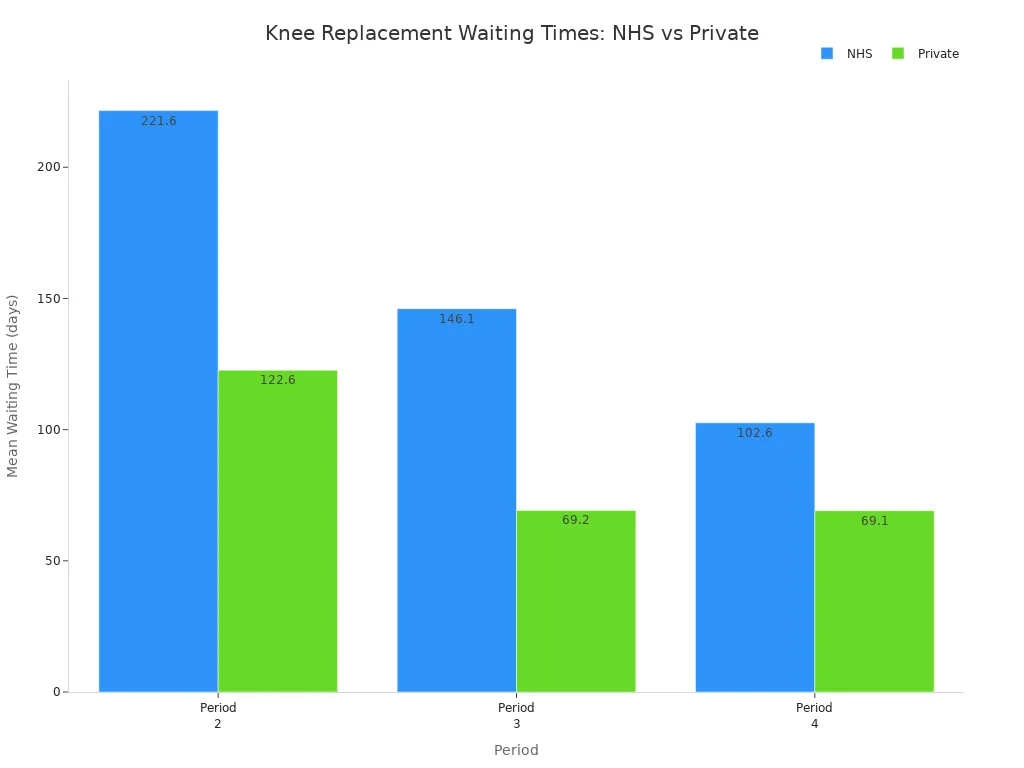
You will see that waiting times to see a consultant are much shorter in private hospitals. You can see a consultant quickly and get your diagnosis and treatment plan without waiting a long time. The NHS consultant pathway has more steps and longer waits, but private hospitals make things simpler.
Other Common Procedures
NHS waiting times for other common procedures are also much longer than private healthcare. You might wait months for surgery or to see a specialist with the NHS. Private hospitals let you get care much faster.
Here is a table showing usual waiting times for different specialties:
Specialty | Typical NHS Waiting Time (Referral to Treatment/Surgery) | Typical Private Access Time (Referral to Treatment/Surgery) | Key Benefit of Private Access |
|---|---|---|---|
Orthopaedics | 25-52+ weeks (e.g., Joint Replacement) | 3-8 weeks | Rapid pain relief, improved mobility, avoids prolonged suffering. |
Ophthalmology | 20-52+ weeks (e.g., Cataract Surgery) | 3-6 weeks | Preserve or restore vision quickly, preventing deterioration. |
Dermatology | 18-26+ weeks (Initial Consult) | 1-3 weeks | Fast assessment and early diagnosis of skin cancers. |
Cardiology | 18-30+ weeks (Diagnostics to Procedure) | 2-8 weeks | Timely diagnosis and potentially life-saving interventions. |
Gastroenterology | 18-36+ weeks (Endoscopy/Colonoscopy) | 2-5 weeks | Quick investigation and early detection of serious conditions. |
Urology | 16-26+ weeks (Initial Consult to Procedure) | 2-5 weeks | Fast resolution of painful conditions and early cancer detection. |
ENT | 18-30+ weeks (Initial Consult to Surgery) | 2-5 weeks | Relief from chronic problems and expedited assessment. |
Neurology | 25-52+ weeks (Initial Consult to Diagnostics) | 3-8 weeks | Rapid specialist access crucial for progressive conditions. |
Mental Health | 12-24+ weeks (Talking Therapy) | 1-4 weeks (limited sessions/acute) | Timely access to support for acute mental health issues. |
General Surgery | 18-36+ weeks (e.g., Hernia Repair) | 2-6 weeks | Swift treatment for common conditions causing discomfort. |
You can see that NHS waiting times for surgery and specialist care are much longer than private options. Waiting to see a consultant in the NHS can take months, but private hospitals give you appointments in days or weeks. This means you get your diagnosis, treatment, and recovery sooner.
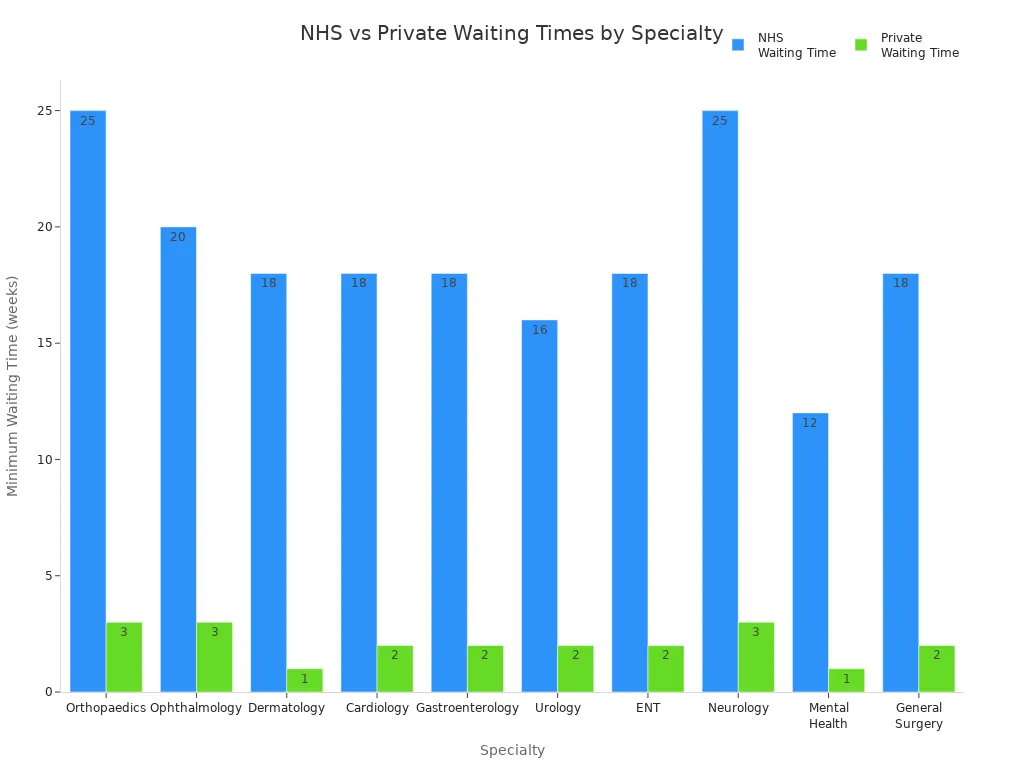
NHS waiting times for planned and non-urgent procedures are much longer than private healthcare. Orthopaedic surgeries, like joint replacements, can have NHS waits over 25-30 weeks, sometimes more than a year. Private hospitals usually let you see a consultant in 1-2 weeks and have surgery 2-6 weeks after diagnosis. You will see the same pattern in ophthalmology, dermatology, cardiology, gastroenterology, neurology, mental health, and general surgery. NHS waiting times can be several months to over a year, but private healthcare gives you much faster access, often in just a few weeks.
Picking private healthcare can help you skip long NHS waits and get care sooner. You will get a quicker diagnosis, faster treatment, and recover more easily.
Impact of Waiting Times on Patients
Access to Care
Getting care quickly depends on how long you wait. NHS waiting times can change when you get surgery or see a specialist. Some consultants work in both NHS and private hospitals. They may not try hard to make NHS waits shorter. Longer NHS waits can make more people want private care. Sometimes, NHS rules mean less urgent cases are seen before serious ones. This can make it tough to get the right care when you need it.
Consultants often help patients who are close to target times, not always those who need help most.
Trying to meet targets can make data look better than it is.
Making waits shorter in one place can cause longer waits somewhere else, which is not always fair.
You should know the NHS does not work like a queue in a shop. Your spot should be based on your health needs, not just how long you have waited. Private healthcare often lets you get surgery faster. This can help you avoid these problems and pick what is best for you.
Health Outcomes
Waiting a long time for surgery can hurt your health. If you wait weeks or months for NHS surgery, you might lose muscle, feel more pain, or get worse. For example, waiting for hip or knee replacement can cause muscle loss and joint trouble. Delays in heart surgery can lead to lasting heart damage. Waiting for cataract surgery can make your sight worse and raise your risk of falling.
Medical Specialty | Common Condition | Impact of Delays (Waiting Harm) |
|---|---|---|
Orthopaedics | Hip/Knee Replacement | Muscle loss, worse joints, more pain, less independence, poorer results |
Cardiology | Valve Repair, Angioplasty | Lasting heart damage, higher heart failure risk, heart gets worse |
Ophthalmology | Cataract Surgery | Sight gets worse, more falls, cannot drive, feel alone, higher dementia risk |
Gynaecology | Endometriosis, Fibroid Removal | More pain, possible fertility problems, worse mental health |
Gastroenterology | Hernia Repair, Gallbladder Removal | Risk of emergencies, pain that affects life quality |
Neurology | Carpal Tunnel Decompression | Lasting nerve damage, lose hand movement and feeling |
If you choose private healthcare, you can get surgery much faster. This can stop some problems and help you recover better. Getting surgery sooner means less pain and a better chance to get well.
Patient Experience
How you feel as a patient is important. Long NHS waits can make you feel worried or upset. Studies show waiting times change how much you trust the NHS. If you wait too long in A&E or for cancer checks, you may trust the NHS less. Many people say waiting for surgery is stressful and can hurt their mental health.
Long waits can make you feel forgotten or not important.
You may worry your health will get worse while you wait.
Some people leave NHS lists to get private surgery for quicker care and peace of mind.
"I felt much better once I knew my surgery date. Waiting was the hardest part."
Private healthcare can give you more control over your care. You can pick when to have surgery and get more help and information. This can make things less stressful and help you feel sure about your treatment.
Costs and Value of Private Healthcare
Private Healthcare Fees
You might want to know how much private healthcare costs. Prices change based on where you live and which hospital you pick. Here are some example prices for private surgery in the UK:
Cataract surgery (one eye) starts at about £3,018.
Hip replacement surgery starts at about £14,193.
Knee arthroscopy starts at about £4,697.
Colonoscopy starts at about £2,627.
Gastroscopy starts at about £2,241.
Gallbladder removal surgery starts at about £7,658.
Laparoscopy starts at about £4,135.
ACL repair surgery starts at about £8,257.
Hysterectomy starts at about £9,222.
These prices often include aftercare but do not cover private consultations or tests. You pay these fees yourself unless you have private medical insurance.
Region | Average Cost (£) |
|---|---|
Scotland | ~15,600 |
Wales | ~15,700 |
East of England | ~16,700 |
London | ~15,000 |
South East | ~15,060 |
South West | ~15,110 |
West Midlands | ~15,150 |
Yorkshire and Humber | ~14,760 |
North West | ~14,775 |
North East | ~14,100 |
Northern Ireland | ~14,400 |
East Midlands | ~14,580 |
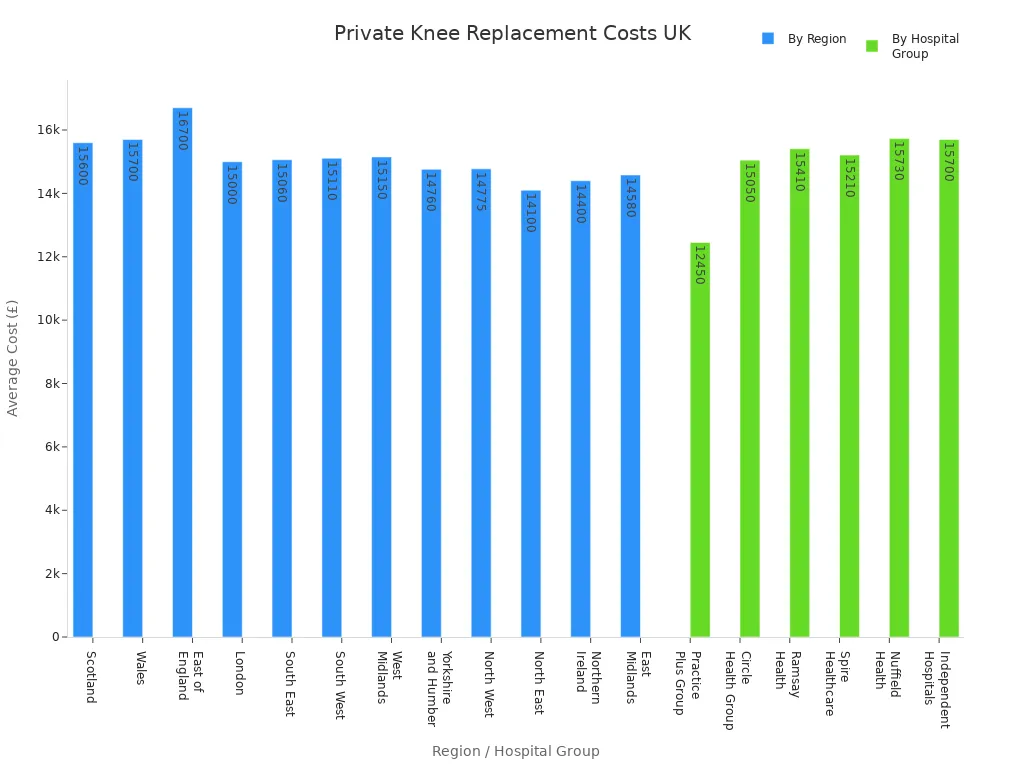
Is Private Worth It?
You might wonder if private healthcare is good value for money. NHS treatment is free for people living in the UK. You do not pay for surgery or hospital stays with the NHS. Private healthcare costs more, but you get surgery faster, private consultations, and private rooms. You can pick your consultant and hospital. You may also get nicer buildings and more comfort.
Private healthcare gives you shorter waiting times and more choice, but you need to think about the higher costs.
People who choose private care often want quicker surgery and more control. You make choices about your care, like a shopper. This feels different from using NHS services. Some studies say private finance does not always give better value than NHS funding. You should think about what matters most to you—speed, comfort, or cost.
Financial Considerations
You need to think about your money before picking private healthcare. NHS care is free, but private care means you pay yourself or use insurance. Insurance costs depend on your age, health, where you live, and what is covered. You can pay less each month by choosing a higher excess, but you pay more when you use your insurance.
Private insurance gives you faster care, choice of consultant, and better rooms.
You may need to pay for private consultations, tests, and surgery.
Loans can help you pay for private surgery over time.
Business owners may get tax benefits for insurance payments.
Insurance often does not cover health problems you already have.
You should check what your insurance covers and what you must pay yourself. Think about your health, how quickly you want surgery, and what you can afford. Private healthcare gives you more choices, but you need to balance these with the costs.
Quality of Care: NHS and Private
Standards and Safety
You might wonder if your care will be safe and good. The nhs has high rules for safety and care. Most nhs hospitals follow strict rules and checks. This helps you trust the care you get, especially for hard surgery or emergencies.
Private hospitals can give great care for planned surgery. Some private places have high standards, but not all do. For-profit private hospitals want to make money, which can change care quality. They often treat younger and healthier people. They may not do complex surgery as well as nhs hospitals.
Here is a table that shows how care is different:
Aspect | NHS Healthcare Providers | Private Healthcare Providers |
|---|---|---|
Quality Standards | Consistent and high | Variable; some high, others lower |
Data Quality Errors | About 17% error rate; more serious errors | |
Specialisation | Broad, including complex surgery | Focus on elective surgery; less complex cases |
Care Continuity | Integrated pathways | Fragmented; may need transfer to nhs |
Patient Safety Oversight | Strong monitoring | Less oversight; some safety concerns |
Note: Private hospitals may not have as much emergency help as nhs hospitals during surgery.
Continuity and Support
You want help before, during, and after surgery. The nhs gives care for your whole journey. You see the same team for surgery, check-ups, and extra treatment. This makes you feel safe and looked after.
Private hospitals focus on planned surgery. You may get care quickly, but it can feel less joined up. Sometimes, you must go back to the nhs for check-ups or if you have problems. Communication between private and nhs teams can break down. This might affect how well you recover.
nhs hospitals train staff more, which keeps care safe.
Private hospitals may have fewer staff and less training for hard surgery.
Some private hospitals hire skilled nhs staff, which can affect nhs care.
If you have complex health needs or need emergency help after surgery, the nhs is better able to help you.
You should think about how much help you want after surgery. The nhs gives more joined-up care, while private care is faster but may have less follow-up.
Making Your Choice
How to Check NHS Waiting Times
You might want to know how long you will wait for surgery or an appointment. You can look up NHS waiting times on official government websites. These sites have the latest information for your area and treatment. The best places to check are StatsWales and Digital Health and Care Wales. These websites show monthly numbers for referral to treatment times, diagnostic services, and patient pathways. You can find out how long people wait for surgery and when you might see a consultant.
Source/Portal | Description | Data Provided |
|---|---|---|
StatsWales (NHS Hospital Waiting Times) | Official government website for NHS Wales | Monthly numbers on referral to treatment times, diagnostic and therapy services waiting times, patient pathways, middle waiting times by local health board, and closed patient pathways |
Digital Health and Care Wales (DHCW) | Source of the numbers shown on StatsWales | Referral to treatment times, diagnostic and therapy service numbers |
FullFact.org also says the NHS goal of 18 weeks is often not met. For some problems, waiting times can be many months or even years. Checking these websites helps you make a smart choice about your care.
Reducing Delays
You can do things to help reduce your wait and get treated sooner. NHS hospitals try different ways to help patients. These include hiring more staff, using new technology, and making better schedules. You might get help from these changes if you need surgery soon.
Hospitals hire more staff and train them to fill empty jobs.
Telehealth and AI help you see a consultant quickly and stop missed appointments.
Triaging and prioritising make sure urgent cases get surgery first.
Better scheduling and open booking help you get an appointment sooner.
Preventative health programmes keep you healthy and lower the need for surgery.
You can ask your GP how to cut your wait and get treated faster. You might also look for community diagnostic centres or ask about digital health choices.
Deciding on Private Healthcare
You can pick between NHS and private healthcare. If you want to see a consultant quickly or need surgery soon, private healthcare gives you more control. You can book private appointments and choose your hospital. Private hospitals let you pick your surgery date and see a consultant when you want. You may pay more, but you skip long waits and get surgery faster.
You should think about your health, your money, and how soon you need surgery. Private healthcare gives you quicker treatment and more comfort. NHS care is free, but you might wait longer to see a consultant or have surgery.
If you want to know how to cut your wait and get treated sooner, compare both choices. Ask questions, check waiting times, and pick what works best for you.
You will wait much longer with the NHS than with private healthcare. The table below shows the main differences between them:
Aspect | NHS Healthcare | Private Healthcare |
|---|---|---|
Often months or over a year | Usually days or weeks | |
Free at point of use | Paid directly or by insurance | |
Limited | Wide choice |
You should think about how long you will wait, how much it costs, and the quality of care before you choose. There is help and information to guide you so you can pick what is best for your health.
FAQ
How can you check your local NHS waiting times?
You can look at the NHS website or StatsWales for Wales. These websites show waiting times for your area and treatment. If you do not understand the information, ask your GP for help.
Will private healthcare always guarantee faster treatment?
Private healthcare often gives you quicker appointments and surgery. Sometimes, you might still wait if your consultant is busy or you need special tests. Always check with your provider to know exact waiting times.
Can you use both NHS and private healthcare together?
Yes, you can use both. Many people get some care from the NHS and pay privately for faster treatment. You can go back to the NHS for follow-up or emergencies if you need to.
Does private healthcare cover all medical conditions?
Private healthcare does not always cover pre-existing conditions or some long-term illnesses. You should read your insurance policy or ask the hospital what is covered before booking treatment.
What happens if you have problems after private surgery?
If you have problems, your private hospital will usually give you aftercare. For serious emergencies, you may need help from the NHS. Always ask about aftercare and emergency plans before your surgery.
See Also
Essential Facts About NHS Waiting Times Explained Clearly
A Complete Guide To Understanding NHS Waiting Periods
How Patients Can Effectively Shorten NHS Waiting Times

